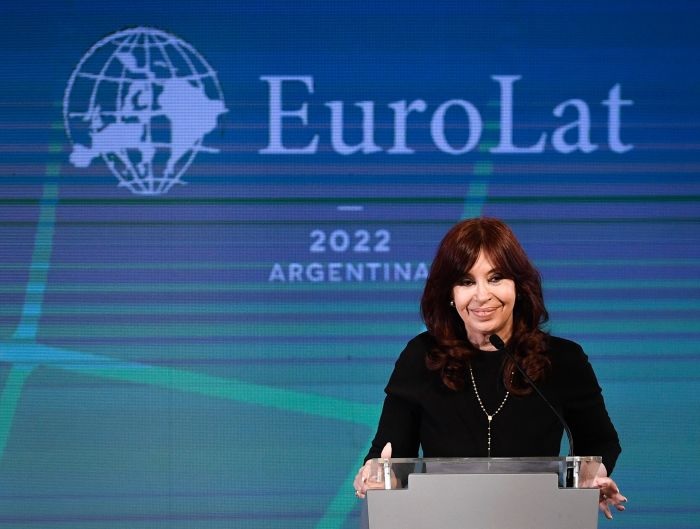RIO DE JANEIRO, BRAZIL – The surprise was capital, and suddenly what was going to be a protocol meeting turned into a scandal. “We are MEPs; we represent Europe and institutions. We are not extras for their Peronist propaganda. All this is unacceptable,” thundered via social networks the Italian deputy Nicola Danti, from the Italia Vive party, in a summary of what many of the legislators who came to the Eurolat deliberations felt when listening yesterday, at the CCK, to Argentina’s Vice President Cristina Kirchner.
“This is how populism works when every occasion becomes good for electoral promotion. It is not the first time that I have experienced this kind of phenomenon, but yesterday it happened to the detriment of the European institutions. And I cannot accept this,” continued the legislator of the center party, complaining about the Vice-President’s speech, in which she sent critical messages to President Alberto Fernández, the Argentine justice system, and the economic leadership before an auditorium full of La Cámpora militants, legislators, and leaders who respond to her amid the fierce official internal conflict.
“I spoke with many European parliamentarians, and they are shocked by what happened. The partisanship of these spaces is never good”, the deputy of the Parlasur María Luisa Storani (UCR) said to La Nación, who presented a motion during the debate after the opening for the Eurolat to condemn “the violations of human rights, especially of women” and asked for “solidarity with Ukraine”. In the same sense, the radical Alfredo Cornejo affirmed that “it is not a good picture or a good message not to express ourselves on the Russian military operation in Ukraine; we expose ourselves to role-playing”.

Yesterday, a group of deputies, most of them from the Spanish Popular Party, issued a statement condemning everything that happened around Cristina’s speech, celebrated with fingers in “ve” and repeated applause by her followers before the passivity and serious faces of a part of the European and also South American legislators.
“We believe that a solemn and institutional act, such as the protocolary opening of the plenary session of the Assembly, cannot be instrumentalized or used for the partisan purpose for which today’s act was held, more typical of a political rally than that of a democratic legislative parliament,” remarked the members of the European People’s Party (center-right) bloc.
In a low voice, the condemnation was extended not only to legislators from the center-right but also to others from progressive parties, both in the tone and setting of the speech and the omission of the vice-president to condemn the Russian military operation in Ukraine explicitly.
Finally, a joint condemnation of Vladimir Putin could not be consensual, as Cristina Kirchner’s position – condemning NATO for “putting a base in Malvinas” and equating Russia with other Security Council members who also “violated international law” – was broadly followed by Kirchnerist parliamentarians, and their like-minded party peers from Bolivia and Ecuador, among others.
As none of the consensus options obtained a majority of the 75 legislators, the co-chairs-Spain’s Javier López and Colombia’s Osvaldo Pérez Pineda-issued a very strong joint declaration in which they “express their condemnation in the strongest terms of the illegal, unprovoked and unjustified military aggression and invasion committed by the Russian Federation against Ukraine in clear violation of the Charter of the United Nations and the outbreak of the largest military conflict in Europe since World War II”, in one of the points of the final communiqué, after disagreements prevented a joint declaration.
It was then “the co-presidents” and not the Eurolat who condemned in writing Putin’s military aggression, the day after the Vice-President’s noisy participation in the meeting of European parliamentarians and parliamentarians, which was wrapped in a maelstrom of discussions and a barely concealed anger of many of those who came to participate from the Old Continent.
With information from La Nacion

